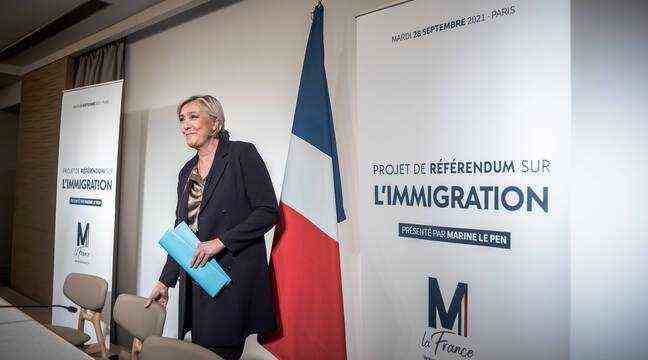The return of two antiphons. Reform migration policy and hear the French by referendum. From Xavier Bertrand to Marine Le Pen via Eric Ciotti, Valérie Pécresse and Michel Barnier, on the right and on the far right, it is immigration that unleashes the passions of presidential candidates. Without forgetting the recurring declarations of the quasi-candidate Eric Zemmour in favor of such a consultation.
“If we look at the recent history of the countryside, it’s always the same thing. Each candidate will tell you: “I will give the floor to the people!” », Notes Florence Chaltiel-Terral. In the collective imagination, “the referendum is democracy. We therefore seek to attract the popular vote to ourselves, ”continues the professor of public law.
“It is not innocent that it is the opposition forces” who propose such consultations, raises the political scientist Florent Gougou. If immigration has always been a campaign issue for right-wing or far-right candidates, “there is a new politicization of institutional issues, which follows the” yellow vests “and their demand for more democracy” , however, notes the teacher-researcher at Sciences Po Grenoble. In the processions, Saturday after Saturday, was not one of the main demands the establishment of a “citizens’ initiative referendum”?
By her referendum proposal presented on Tuesday, Marine Le Pen wants ” give our great immigration policy an indisputable democratic legitimacy “. The RN candidate thus wants the consultation to focus on “national priority”, particularly in terms of housing, employment and social assistance, “thus disconnecting the suction pumps” from immigration. It also proposes that it is no longer possible to register the files of asylum seekers on French soil.
On the side of the contenders for the investure of the Republicans, the proposals vary on the same theme. Valérie Pécresse proposes the establishment of immigration quotas while Michel Barnier wants to establish a “Parliamentary control over immigrant quotas” and “a constitutional shield” in the matter, in order to “regain our freedom of maneuver” vis-à-vis Europe. For Eric Ciotti, the vote will have to bear ” on identity and migration issues and on the protection of our country “. As for the favorite of the polls, Xavier Bertrand, he plans to ask three questions to the French in the fall of 2022. These will concern ”
secularism, the fight against terrorism and immigration », Already specified the president of Hauts-de-France last December.
Why are these proposals not very applicable?
But organizing a referendum is quite an art. It cannot be organized “on everything and anything”, emphasizes Florence Chaltiel-Terral. Article 11 of the Constitution specifies that such a consultation can relate “to the organization of the public powers, to reforms relating to the economic, social or environmental policy of the nation and to the public services which contribute to it”. In summary, “the question of immigration” is quite simply “not in the field of the referendum”, underlines the professor of public law.
“This automatically excludes questions on family reunification or on the right to asylum, which are, in fact, protected by the Constitution”, notes Tania Racho, specialist in European law, in this report. explanatory video. “For questions of contradiction to the Constitution or to international and European commitments”, the vast majority of the proposals made by the candidates will not be able to result in a referendum. “Touching the right of asylum would require in any case to leave international commitments, which is not envisaged, nor anticipated in the referendum proposals”, she explains.
To prevent a question on immigration submitted to a referendum from being deemed unconstitutional, it is possible to modify the Constitution … by referendum! * A tedious process, with “very restrictive” conditions, comments Florence Chaltiel-Terral. “It is far from being won, whatever the power”, because it is necessary to reach a “certain political consensus”.
A thorn in the side that does not seem to disturb any of the aspirants to the Elysee. “We can assume that there is a strategic use of the promise of the referendum”, emphasizes Florent Gougou. This allows “to play the card of the people and give them the floor to decide to make a public policy”, even if the candidates are aware that these are not “things that are achievable, but that they are approaching to ride the wave. democratic openness ”.
* Or by the Parliament meeting in Congress in Versailles, as during the previous constitutional reform in 2008, which had established the referendum of shared initiative.

